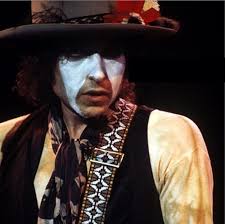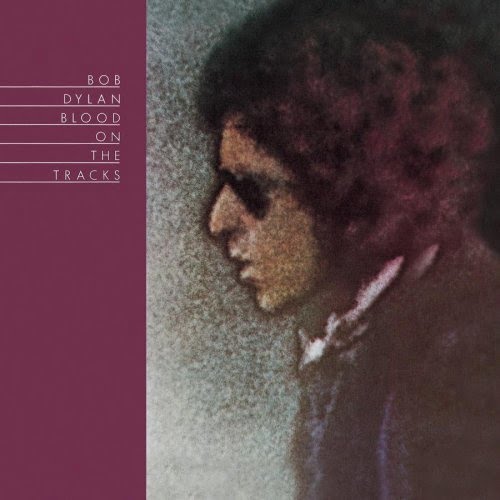Two Bitter Love Songs from Blood on the Tracks
EXTRACTS (Full text here)
In the only live version on the Rolling Thunder Tour, recorded at Lakeland Florida on April 18th 1976, the lyrics are completely rewritten, now in an AABB rhyming scheme. The woman is now in ‘North Saigon’. Despite the fact that the American retreat from Vietnam was then a fairly recent event, this choice is more random than significant. The narrator confesses that …You might say that I’m in disarray and for me time’s standing still/ I’ve never gotten over her and I guess I never will… At least here he appears to be more honest about his feelings. The second verse is more of a departure, as the narrator refers to seeing a ‘bright light’ and a ‘scattering of souls’ which he calls …Just one of those reckless situations which nobody controls… He refers to the ‘menagerie of life’ ..going on right before my eyes… and tells us that …We all do the best we can which should come as no surprise… These statements all appear to be unconvincing testaments by the narrator. In the final verses the narrator’s desperation leads him to threaten the third party: … Right now I’ve not got much to lose… he tells him …So you’d better stay away… In the final verse he lets his fantasies take over: …I know she’ll be back one day/ Of that there is no doubt… are very surprising lines, but not as surprising as the final denouement: …And when that moment comes, Lord give me the strength to keep her out… In this version of the song the narrator is much less guarded, and far more prone to giving rein to his fantasies, but the final twist suggests that his sense of guilt is even stronger than before.

If You See Her, Say Hello is a hard song to sing as it eschews refrains and choruses and relies on the singer making the listener both sympathise with him and pity him. Despite Dylan’s denials of its autobiographical nature, there is little doubt that its composition was linked to his personal feelings about the breakup of his marriage, even if it would be a mistake to identify the song’s narrator directly with Dylan himself. The later versions of the song, though often more developed musically, tend to tone down the extreme emotions, presumably because by then Dylan himself no longer felt those confusing and contradictory feelings so strongly. In You’re a Big Girl Now the subterfuge of If You See Her is largely absent. The song is delivered with great linguistic and musical power. As with If You See Her, there are five verses and no chorus; although at the end of each verse there is a slight musical shift to introduce a changing refrain. The song also has a very strong and affecting melody, and is punctuated by instrumental interludes led by Dylan’s emotive harmonica.

The song begins somewhat tentatively, with the narrator mouthing clichés uncertainly: …Our conversation was short and sweet/ It nearly knocked me off-a my feet… The addition of the ‘a’ to ‘off’ gives the vocal a little ‘kick’. But both statements are questionable. The conversation he is referring to is presumably the one in which she gave him the ‘brush off’. It may have been short, but why would he consider it to be sweet? The expression ‘to knock someone off their feet’ usually refers to someone being ‘swept away’ in love by a particularly dynamic partner, whereas here he has been knocked off his perch by her rejection. The narrator seems to be reaching out for any cliché he can find. The following …I’m back in the rain/ And you are on dry land… is a representation of his confusion. Dylan frequently uses rain as a metaphor, most obviously in songs like A Hard Rain’s a-Gonna Fall or Shelter from the Storm and more obscurely in Just like a Woman where the narrator ‘stands inside the rain’. In such songs rain tends to symbolise confusion, or even chaos. But here the metaphor sounds somewhat awkward, having little resonance with the initial lines. The title phrase, used here for the only time at the end of the verse, sounds rather patronising – a rather feeble recognition of the fact that she seems to have ‘made it somehow’ to dry land. She appears, at least in his eyes, to have escaped the relationship unscathed. He sounds desperate, and spends much of the song searching for the appropriate words to express his situation. After this, and the subsequent ‘refrains’ in the final lines of the verses, there is a judicious pause in the music, as if he is taking a deep breath before continuing. There is no doubt that he is very traumatised by what has taken place.

He then stares into the distance and sees a …bird on the horizon/ Sitting on a fence… who is …Singing a song for me/ At his own expense… As the bird is on the horizon it is obviously some distance away, suggesting that she may not even hear its song. It may already be obvious to us that he himself is that bird; attempting to reach her but failing pitifully. In case she had not picked up on this, he then spells it out to her: …I’m just like that bird… he tells her …Singing just for you… But then he drops the slightly superior tone, to plead with her: …I hope that you can hear/ Hear me singing through these tears… These are the first genuinely moving lines in the song as, despite all his bluster, the tragic nature of how he is really feeling becomes apparent. In the next two verses, however, he falters. Both verses begin with supposedly meaningful but actually rather unconvincing statements. …Time is a jet plane/ It moves too fast… and …Love is so simple, to quote a phrase… Both of these ‘philosophical’ statements are backed up by the narrator flailing around desperately. In the first case he whimpers …But, oh what a shame, that all we’ve shared won’t last… He promises that …I can change, I swear… but with the lack of consistency he has shown, it is very hard for the listener – or the object of the song – to believe him. In the next verse, the rather simplistic first line (a reference to a line spoken in Marcel Carne’s Les Enfants du Paradis, one of Dylan’s favourite films) is followed by him conceding that …You’ve known it all the time/ I’m learning it these days… his first despairing admission that she may in fact be a whole lot wiser than him, although we may well have suspected this already. His tearful admission that …I know where I can find you/ In somebody’s room… is followed by him attempting to swallow his pride: …It’s a price I have to pay/ You’re a big girl all the way… but it is hard to sympathise with such maudlin self-pity.



Leave a Reply